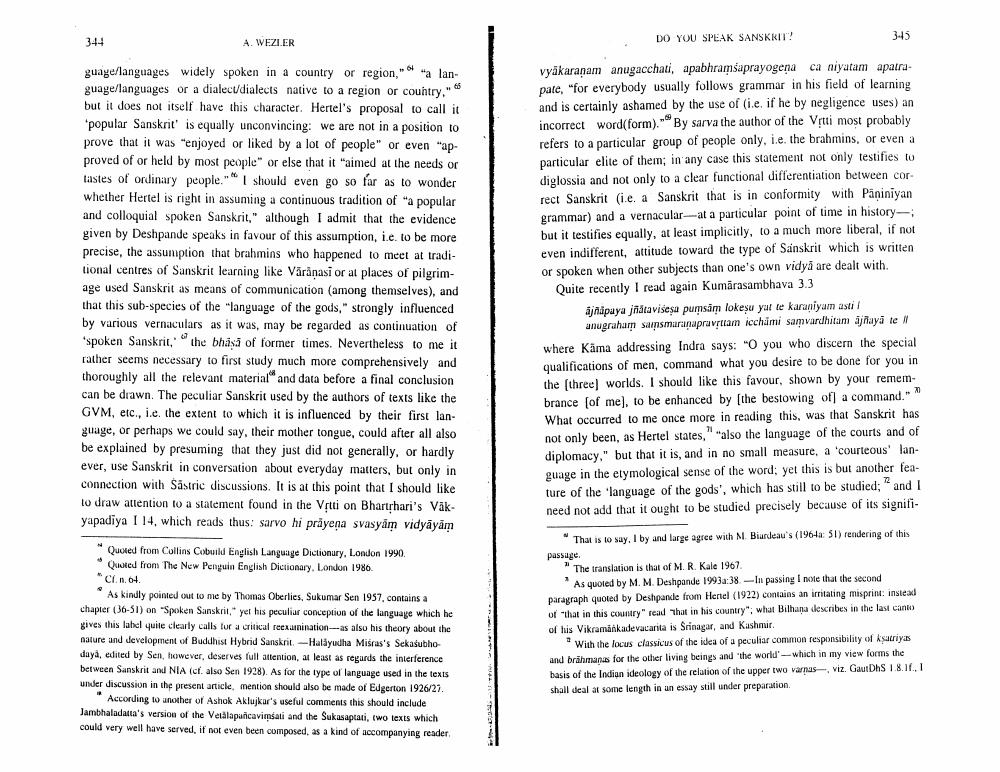________________
345
DO YOU SPEAK SANSKRIT?
A. WEZI.ER
guage/languages widely spoken in a country or region," "a language/languages or a dialect/dialects native to a region or country." but it does not itself have this character. Hertel's proposal to call it
popular Sanskrit' is equally unconvincing: we are not in a position to prove that it was "enjoyed or liked by a lot of people" or even "approved of or held by most people or else that it "aimed at the needs or tastes of ordinary people." I should even go so far as to wonder whether Hertel is right in assuming a continuous tradition of a popular and colloquial spoken Sanskrit," although I admit that the evidence given by Deshpande speaks in favour of this assumption, i.e. to be more precise, the assumption that brahmins who happened to meet at tradiLional centres of Sanskrit learning like Varanasi or at places of pilgrimage used Sanskrit as means of communication (among themselves), and that this sub-species of the language of the gods," strongly influenced by various vernaculars as it was, may be regarded as continuation of spoken Sanskrit,' "the bhayā of former times. Nevertheless to me it rather seems necessary to first study much more comprehensively and thoroughly all the relevant material and data before a final conclusion can be drawn. The peculiar Sanskrit used by the authors of texts like the GVM, etc., i.e. the extent to which it is influenced by their first language, or perhaps we could say, their mother tongue, could after all also be explained by presuming that they just did not generally, or hardly ever, use Sanskrit in conversation about everyday matters, but only in connection with Sastric discussions. It is at this point that I should like to draw attention to a statement found in the Vrtti on Bharthari's Vákyapadiya I 14, which reads thus: sarvo hi prayena svasyām vidyāyām
vyakaranam anugacchati, apabhramsaprayogena ca niyatam apatra pate, "for everybody usually follows grammar in his field of learning and is certainly ashamed by the use of i.e. if he by negligence uses) an incorrect word(form). "By sarva the author of the Vitti most probably refers to a particular group of people only, i.e. the brahmins, or even a particular elite of them; in any case this statement not only testifies to diglossia and not only to a clear functional differentiation between correct Sanskrit (i.e. a Sanskrit that is in conformity with Paniniyan grammar) and a vernacular--at a particular point of time in history but it testifies equally, at least implicitly, to a much more liberal, if not even indifferent, attitude toward the type of Sanskrit which is written or spoken when other subjects than one's own vidya are dealt with Quite recently I read again Kumārasambhava 3.3
ajnapuya jõtavisesa pumsām lokeșu yal te karaniyam asti
anugrahan Susmiranupruvrtcam icchami samvardhitam ajaya tel where Käma addressing Indra says: "O you who discern the special qualifications of men, command what you desire to be done for you in the (three) worlds. I should like this favour, shown by your remembrance (of me), to be enhanced by the bestowing of a command." What occurred to me once more in reading this, was that Sanskrit has not only been, as Hertel states, also the language of the courts and of diplomacy," but that it is, and in no small measure, a 'courteous' language in the etymological sense of the word; yet this is but another feature of the language of the gods', which has still to be studied; and I need not add that it ought to be studied precisely because of its signifi
Qucted from Collins Cebuild English Language Dictionury, London 1990.
Que From The New Penguin English Dictionary. London 1986 *CI.not.
As kindly pointed out to me by Thomas Oberlies, Sukumar Sen 1957, contains a chapter (36-51) on Spoken Sanskrit, yet his peculiar conception of the language which he kives this label quite clearly calls for a critical recinations also his theory about the nature and development of Buddhist Hybrid Sanskrit -Halayudha Misras's Sekaubho daya, edited by Sen, however, deserves full attention, at least as regards the interference between Sanskrit and NIA (c.also Sen 1928). As for the type of language used in the texts under discussion in the present article, mention should also be made of Edgerton 1926/27.
According to another of Ashok Aklujkar's useful comments this should include Jambhaladatta's version of the Verlapuricavimsati and the Sukasaptati, iwo texts which could very well have served, if not even been composed, as a kind of accompanying reader
That is to say, I by and large agree with M. Biurdeau's (1964a: 51) rendering of this passige.
The translation is that of M. R. Kale 1967
As quoted by M. M. Deshpande 19932:38-In passing I n e that the second paragraph quoted by Deshpande from Hertel (1922) contains an irritating misprint: instead of that in this country read that in his country": what Bilhana describes in the last canto of his Vikramarkadevacarita is Srinagar, and Kashmir
With the locus classicus of the idea of a peculiar common responsibility of ksatriyas and brähmanas for the other living beings and the world' which in my view forms the basis of the Indian ideology of the relation of the upper two varnus, viz. Gaur DhS 18.11., 1 shall deal at some length in an essay still under preparation




